Key takeaways:
- Selective mutism is a complex anxiety disorder that affects communication in specific social situations, often manifesting in children who can speak comfortably in familiar settings.
- Peer support groups provide a safe space for individuals with selective mutism to share experiences, fostering understanding and connection among members.
- Active participation in groups, including preparation and active listening, enhances engagement and emotional connection, making it easier to confront challenges and share vulnerabilities.
- The power of empathy and shared experiences within support groups can lead to personal growth, motivation, and a sense of belonging, emphasizing the importance of community in overcoming struggles.
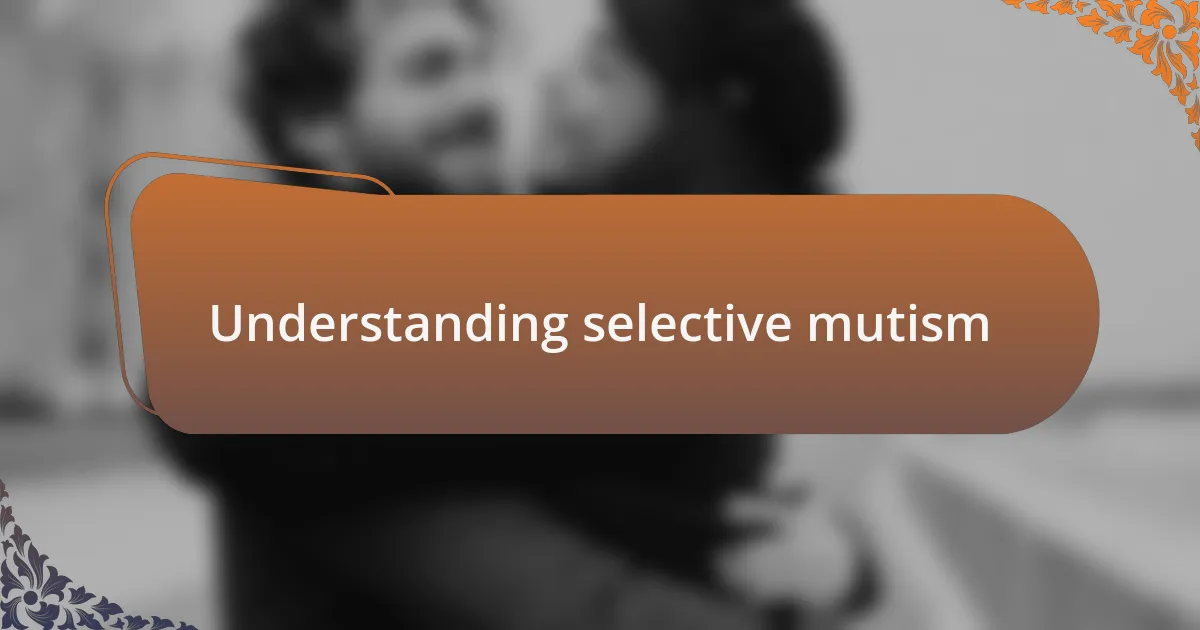
Understanding selective mutism
Selective mutism is more than just a reluctance to speak; it’s a complex anxiety disorder that impedes communication in certain social situations. I remember the first time I felt the weight of those invisible chains—standing in a classroom, surrounded by eager voices, yet feeling utterly trapped. Have you ever experienced a moment where the words just wouldn’t come, no matter how hard you tried?
This condition often manifests in children who are otherwise capable of speaking comfortably in familiar settings. For instance, I vividly recall a friend who could chatter away with her family at home but would freeze like a deer in headlights at school. It makes you wonder how many others might be experiencing the same silent struggle.
Understanding selective mutism requires empathy and patience, as it often stems from deep-seated anxiety rather than willful silence. Just think about how isolating it can feel when you yearn to express yourself but your mind and body conspire against you—it’s a feeling I know all too well. This condition isn’t simply about choosing not to speak; it’s about an overwhelming fear of judgment or misunderstanding.
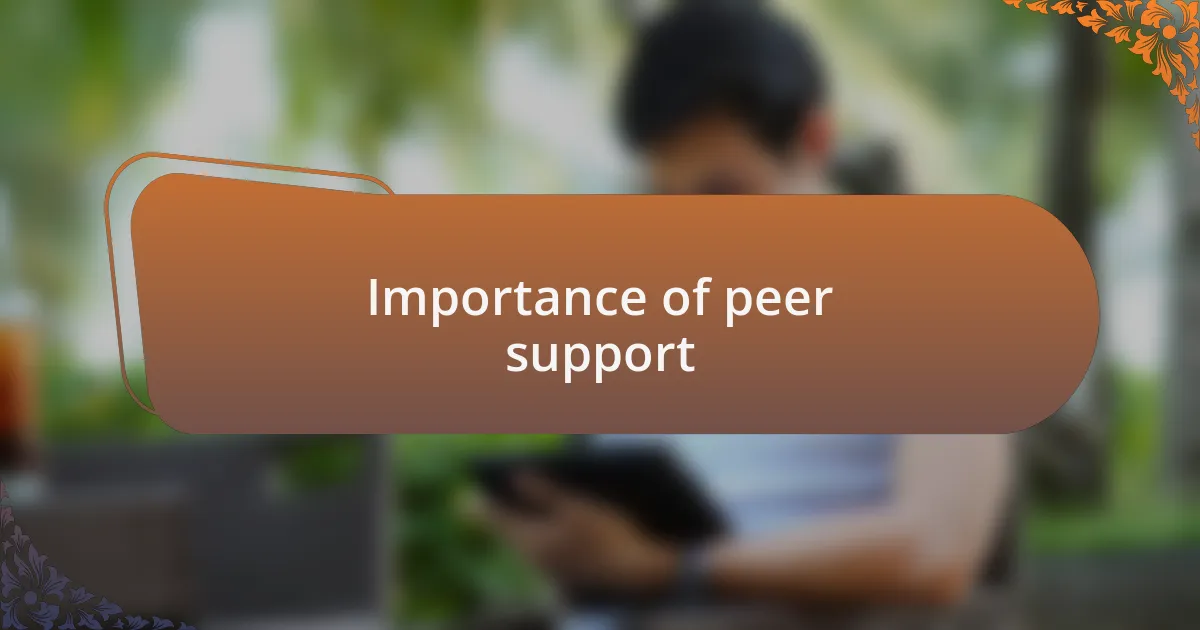
Importance of peer support
Peer support is vital for individuals facing selective mutism, as it creates a safe space where shared experiences foster understanding and connection. I remember attending a peer support group for the first time; talking to someone who genuinely understood my struggles felt like a breath of fresh air. Have you ever found solace in the company of those who share your journey? It can be incredibly uplifting.
The strength of peer support lies in its relatability. Unlike traditional therapy, sharing stories among peers allows for a unique bond, as we empathize with one another’s fears and victories. One group member shared a story about how they spoke their first word in years at an event we organized together. Witnessing that moment solidified my belief in the power of collective encouragement.
Feeling isolated while dealing with selective mutism can be paralyzing. However, knowing that others are navigating similar challenges can help ease that loneliness. I recall moments in group meetings where a simple nod or smile from someone across the room spoke volumes, reminding me that I was not alone in this journey. Isn’t it reassuring to know that you are among allies who understand your silent battles?
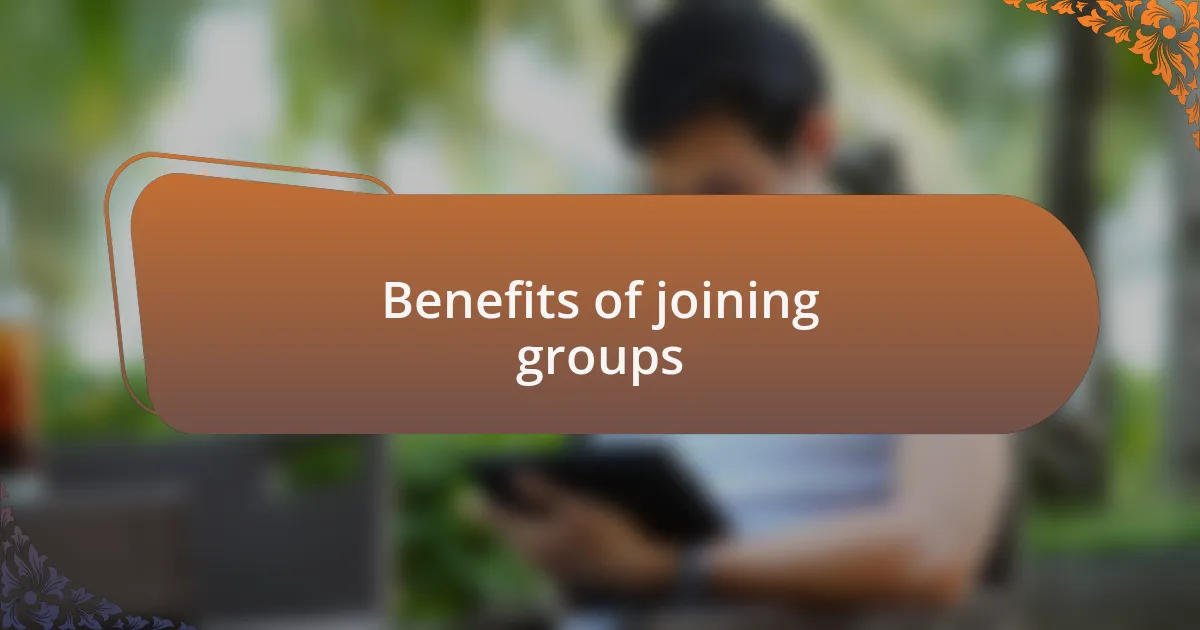
Benefits of joining groups
Joining a peer support group can be transformative in numerous ways. For instance, during one of my early sessions, a member shared their experience of slowly learning to communicate in public, and I could feel the ripple of hope that spread through the room. It sparked a realization within me; listening to others’ journeys illuminated my own path forward. Have you ever felt that surge of motivation just from hearing someone else’s success story? It’s powerful.
The sense of accountability developed within these groups is another significant benefit. When I committed to sharing my progress each week, I felt an underlying encouragement to push myself outside my comfort zone. Knowing that others were cheering for my progress while sharing their own set of challenges created a unique bond that motivated us all to do better. Isn’t it amazing how the support of others can propel you to take steps you might have hesitated to take on your own?
Another remarkable aspect of peer groups is the shared learning they facilitate. I recall a session where we discussed strategies for reducing anxiety in social situations. Someone mentioned a technique they learned from their therapist, and it ended up being a game-changer for me. The collaborative nature of these interactions not only makes you feel valued but also enriches your toolkit with practical coping strategies that you might not have encountered otherwise. How can that not make you feel empowered?
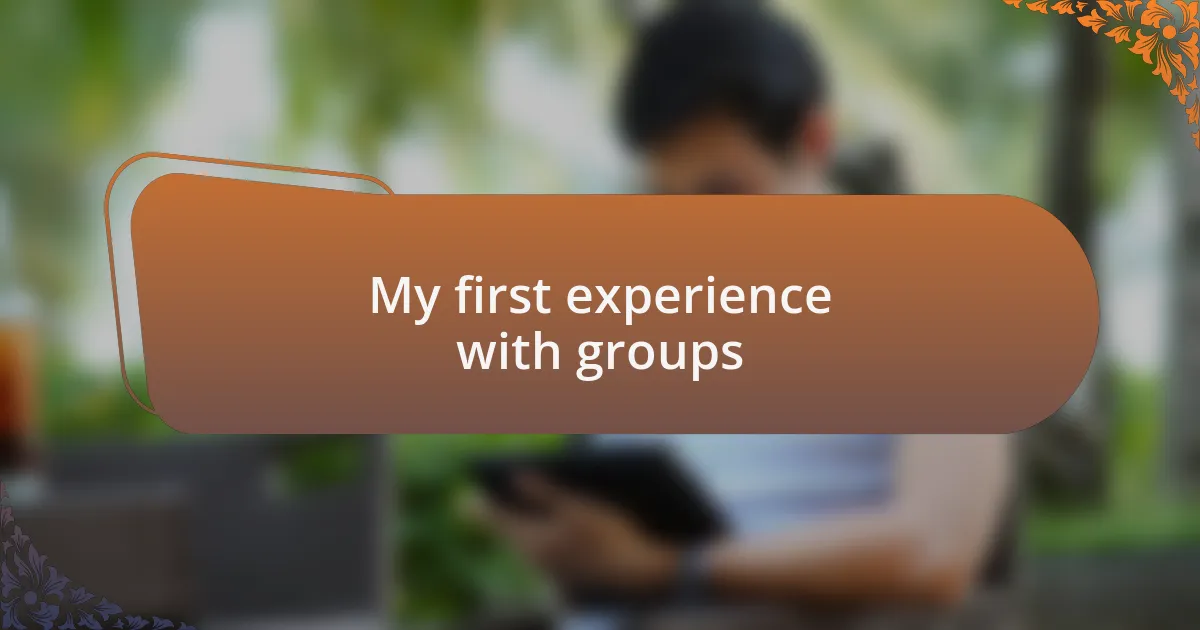
My first experience with groups
My first experience with peer support groups was both nerve-wracking and exhilarating. Walking into that room full of strangers, my heart raced, and I couldn’t shake the sensation of being an outsider. Yet, as the group began to share their stories, I felt an unexpected wave of relief wash over me. Have you ever had that moment when you realize you’re not alone in your struggles? It’s eye-opening.
During that initial meeting, I vividly remember one member who spoke about their own battles with selective mutism. As they described their fear of speaking up in class, I could see the tears glistening in their eyes. It struck a chord deep within me. In that moment, I understood how powerful vulnerability can be. Sharing our fears not only helps us heal but also fosters connections that often feel impossible outside these walls.
By the end of the session, I found myself wanting to contribute but held back, grappling with my own insecurities. Why is it so hard to share even when we know others understand? I realized that my silence was a testament to my journey, and perhaps one day, I would have the courage to speak up. That experience ignited a spark in me—a desire to engage, learn, and ultimately grow alongside others who were facing similar challenges.
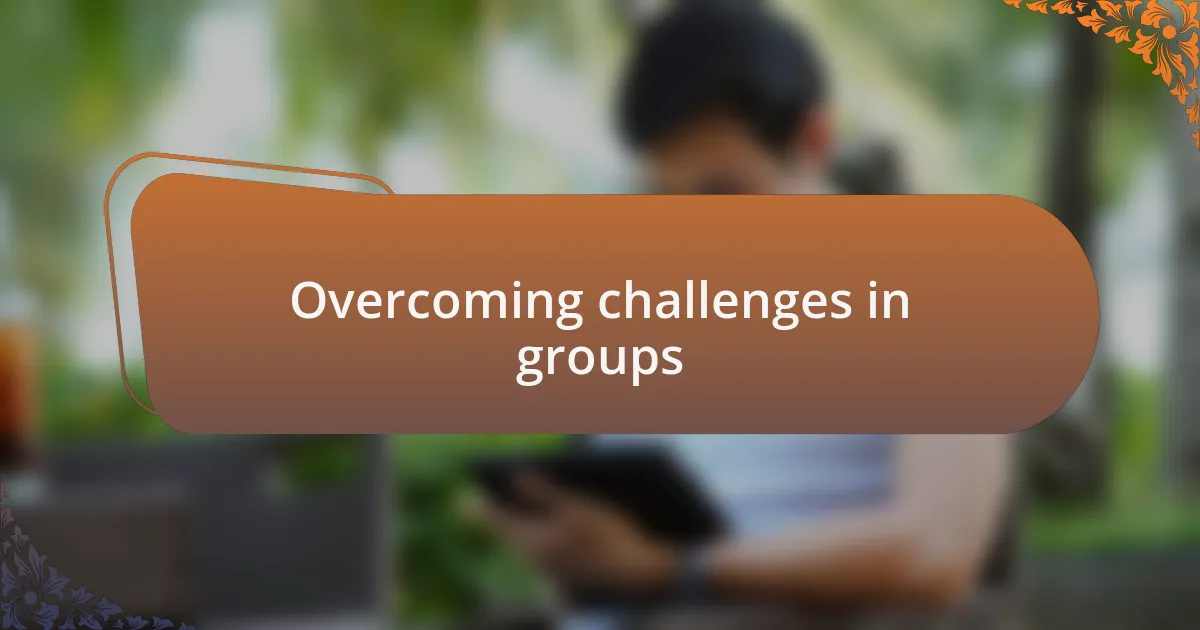
Overcoming challenges in groups
Overcoming challenges in a group setting can often feel like climbing a steep hill. I remember attending one session where everyone was encouraged to share something about their week. As I listened to others open up, I kept thinking, “What if my experience isn’t valid?” That internal dialogue left me paralyzed. It took a gentle nudge from the group leader—a reminder that everyone’s voice adds value—to finally spark the courage to share just a few words. That moment was pivotal for me, illustrating that vulnerability can often pave the way for connection.
Navigating the dynamics of a support group isn’t always smooth sailing. I encountered moments when silence filled the room, thick and heavy. There was one instance when we faced a particularly emotional topic, and I noticed a fellow participant visibly struggling. Instead of allowing the discomfort to fester, we decided to engage in a simple group activity that shifted the focus. It brought the energy back and reminded us how teamwork could transform a challenging moment into something constructive. Doesn’t it often take a collective effort to ease tension and restore comfort in vulnerable situations?
Sometimes, the greatest challenge was simply showing up consistently. I wrestled with feelings of inadequacy, worrying that my absence would impact the group. During one meeting, I expressed my doubts, and to my surprise, others echoed my sentiments. It reinforced a valuable lesson: we’re all in this together, and our participation matters, no matter how small. Have you ever felt that pressure to be perfect? The reality is, it’s our imperfections that make our journeys relatable and our struggles human.
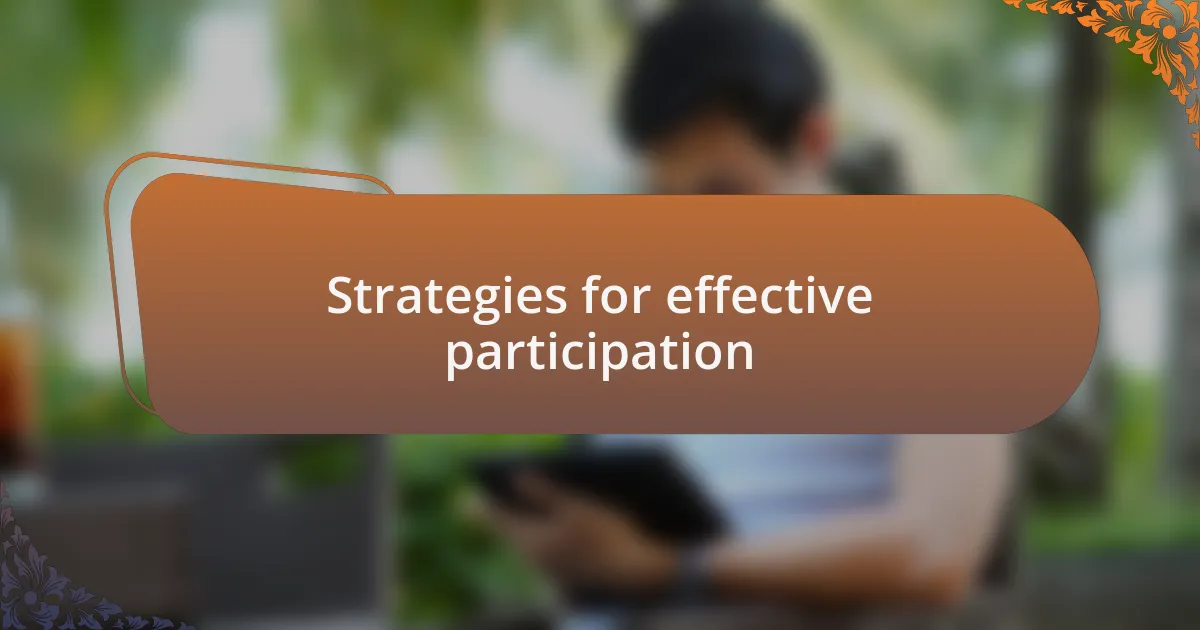
Strategies for effective participation
Being present in a support group often means more than just showing up physically; it’s about engaging emotionally too. I remember one session where we were asked to write down our feelings on cards anonymously. As we shared those thoughts, I felt an unexpected wave of relief wash over us. Have you ever felt lighter just by putting your feelings into words? It’s astonishing how this small act of vulnerability can foster deeper connections within the group.
Finding a personal strategy that works for you can be invaluable. For me, I began to prepare a few thoughts beforehand on what I wanted to share. During one particularly tough meeting, having that prepared helped me feel more confident. It was reassuring to know that I had something meaningful to contribute, even if it was just a few sentences. How often do you find yourself wishing you had said something once the moment passes? Preparation can be a simple yet effective way to enhance your participation.
Another significant strategy is to practice active listening. In one memorable session, I focused entirely on my peers, pushing aside my internal chatter. This shift allowed me to better understand their struggles and joys and, surprisingly, encouraged me to express my own feelings. Isn’t it fascinating how much we can learn just by being fully present for others? This active involvement creates a ripple effect, inspiring everyone to engage and share more openly.
What I’ve learned from others
Listening to others has taught me the profound impact of shared experiences. I once sat quietly, absorbing a fellow member’s story about their struggles with speaking in public. Their honesty resonated so deeply that it made me question the reasons behind my own fears. Have you ever found a piece of someone else’s story that reflects your own feelings? That moment showed me that shared vulnerability can forge bonds that previously felt impossible.
One lesson that stands out is the power of empathy. During a particularly emotional session, I noticed how a small gesture—like a nod or a reassuring smile—could change the atmosphere of the room. I remember thinking about how simple validation can help someone feel seen and heard. Have you experienced that comforting sense of belonging when someone else understands your journey? It’s in those moments that I realized we’re not just individuals with separate struggles; we’re connected by our emotions and stories.
Through these interactions, I also learned the importance of accountability. In one instance, a peer shared his commitment to practice speaking daily, and it inspired me to do the same with my own goals. I found myself asking, “What am I willing to commit to sharing in this space?” That question pushed me to set personal benchmarks for my progress. Isn’t it powerful to know that simply being in a group can motivate us towards collective growth? These reflections have shaped my journey, emphasizing that we learn as much from each other as we do from ourselves.